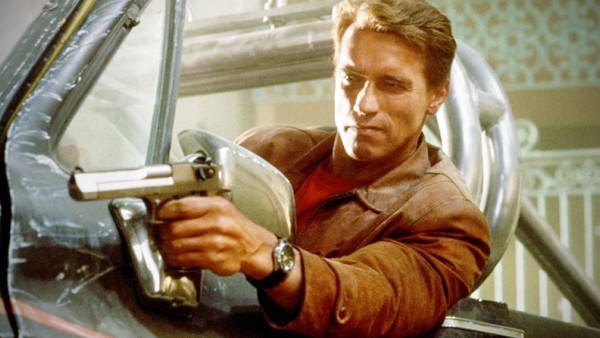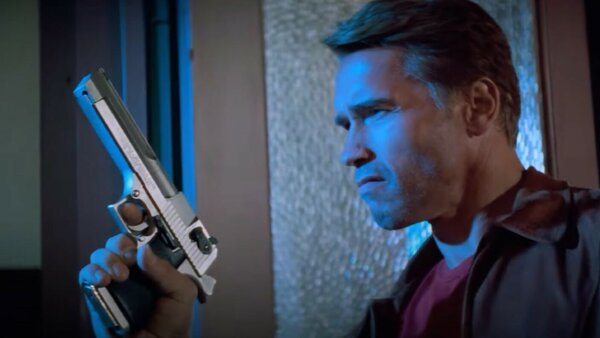Think You Know Last Action Hero? Think Again
Why John McTiernan Was The Perfect Director For Last Action Hero

It's on brand for Schwarzenegger, but also McTiernan, illustrating again his talent for genre deconstruction and recalibration, which he achieved excellently with Predator and Die Hard. Original screenwriter Zak Penn remarked in that Empire piece that they had foreseen a filmmaker like Robert Zemeckis or John Landis taking on "Extremely Violent" - directors who, in his view, had a "history of pulling genres apart" - rather than an action heavyweight like McTiernan, citing a belief that genre mockery is more difficult for those who come from that space to begin with.
But this feels like an underestimation of McTiernan. Predator, perhaps the greatest action movie of all time, is also one that is extremely conscious of genre convention, starting out like a traditional "men on a mission" movie before shifting gears into sci-fi horror. Die Hard (and, to a lesser extent, The Hunt for Red October) spotlight action protagonists spiritually at odds with their contemporaries, with John McClane showing that it was just as cool for an action hero to get chewed up and spat out as much as it was to see them gun down hordes of gun-toting bad guys. These films describe a filmmaker invested in or at least intimately familiar with genre mechanics, which made him a natural fit for Last Action Hero - even with the oscillating tonal pulls and influences that occurred during its production.
Despite those tonal battles being plain to see in the finished product (as well as the madcap few weeks he was left with to get the film edited), it's impressive how well McTiernan was able to thread it all together. The end result is more than cohesive, with McTiernan anchoring the story of Last Action Hero around a young boy who has lost his father and is trying to fill that hole with the movies. As an emotional crux it's aged superbly; Austin O'Brien is funny, believable and sympathetic as Danny, and plays off excellently against Schwarzenegger, whom he greets with a mixture of wide-eyed wonder and incredulousness. The latter is clearly having fun playing around in the exaggerated and cartoony sandbox that is Jack Slater's world, until eventually he is forced to mature and confront reality. Once Danny takes him out of the movie universe, Arnie's performance shifts into a balance of affable, paternal concern and existential anxiety, McTiernan providing the perfect stage for which to poke fun of and process the actor's Hollywood legacy.
It's a shift that's reflected brilliantly in Last Action Hero's visuals, which may be some of the best in McTiernan's locker. Shot by Dean Semler, the film strikes a perfect contrast between glum reality and Hollywood majesty and silliness. In many ways, it's a film of varying temperatures. New York City is cast in greys, blues, and blacks, while Nick's cinema - decaying though it may be - is presented in a golden hue. Danny enters a new dimension even before he makes the literal leap into Slater's films, which are themselves rendered in bright, block colours that intimate a new level of fantasy. The way McTiernan and Semler blend these temperatures together in the neon-lit and rain-soaked finale makes for one of the most vibrant and expressive action movie third acts we've ever gotten, as Jack confronts The Ripper and Charles Dance's Benedict, and parts ways with Danny.
This conclusion is as much a clash between worlds as it is a confrontation with reality. Jack has to reconcile fantasy with real life and carry his new humanistic experiences with him, thereby transcending caricature status, while Danny essentially has to make peace with losing his father and how the movies, while a comfort, can't be a replacement. There's lots of fluid, dynamic action, starting with Jack gatecrashing the Jack Slater IV premiere and saving (and then punching) Arnold Schwarzenegger, before moving to the rooftops in a traumatic redux of one of his older movies' endings. It all culminates with the deaths of The Ripper and Benedict, who manages to mortally wound Jack - a sentence that means he must return to the movie world if he is to have any chance of survival.

What follows leads to some of the most emotionally raw acting in Schwarzenegger's career, as surrogate father and son make their tearful but necessary goodbyes. O'Brien is excellent here as well, crystallising all that unspoken trauma as he loses yet another father figure, before eventually coming to terms with death (a literal manifestation, in this case) and accepting his own future. It's the kind of journey that feels reflective of Last Action Hero's introspective instincts, particularly as it pertains to the idea of Schwarzenegger taking stock of his own legacy. Arnold confronts "Arnie" - Danny confronts death. These are two tonal and emotional extremes, but the idea of taking a step back and looking inward is conveyed both literally in the story and through its metatextual elements, with Danny and Jack learning to live beyond the movies, but still carry them with them.
In what could be seen as a typical example of Last Action Hero's tonal dissonance, in and amongst all this emotional heartache is Ian McKellen as the version of Death seen in Ingmar Bergman's The Seventh Seal, brought to life by Benedict's magic ticket hijinks. McKellen plays the part with full theatric commitment, and it adds plenty of levity to the scene, but not in a way that undermines the film's emotional peak. Rather, it exemplifies how deftly Last Action Hero handles its contrasting tones and worlds, with McKellen getting arguably the most uplifting line in the film, telling Danny that he dies a grandfather and thus reminding him in the process that he has so much more left to live for. It's bizarre, funny, and heartwarming all at once - a moment that epitomises the film's best elements, as well as its infectiously charming incongruities.
[Article concludes on next page...]